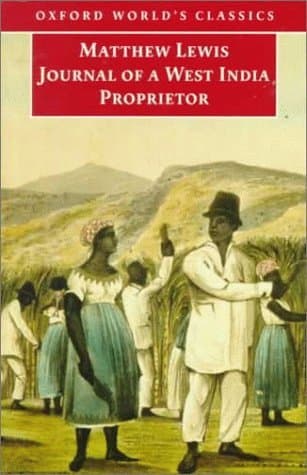
Book Review Summary: Journal of a West India Proprietor: Kept during a Residence in the Island of Jamaica
Introduction
"Journal of a West India Proprietor: Kept during a Residence in the Island of Jamaica" by Matthew Gregory Lewis is a captivating account of plantation life from the perspective of a slave owner. Lewis, best known for his Gothic novel "The Monk," inherited two large sugar plantations in Jamaica and made two visits to investigate the living and working conditions of his slaves. This book provides a vivid and honest portrayal of the challenges and complexities of plantation ownership during the early 19th century. In this article, we will delve into the author's background, analyze readers' views on the book, and discuss the reasons for both recommending and not recommending it.
About Matthew Gregory Lewis
Matthew Gregory Lewis, often referred to as "Monk" Lewis, was an English novelist and dramatist. Born into a family with connections to Jamaica, Lewis inherited two large plantations in the island. He documented his experiences and observations in "Journal of a West India Proprietor," offering a unique perspective on the life of a slave owner. Lewis's literary career spanned several decades, and his works often explored themes related to morality, social issues, and Gothic horror. Despite his controversial background as a slave owner, Lewis's writing continues to captivate readers today.
Analysis of Views
-
Historical Insight: Readers praise the book for providing valuable historical insights into plantation life in Jamaica during the early 1800s. Lewis's keen observations and attention to detail create a vivid picture of daily life on the plantations, including interactions between slaves and their owners.
-
Engaging Writing Style: Many readers appreciate Lewis's writing style, which is described as engaging, sometimes humorous, and occasionally shocking. His ability to convey complex emotions and experiences makes the book an enjoyable read despite its uncomfortable subject matter.
-
Unflinching Honesty: Lewis's diary is commended for its unflinching honesty about the realities of plantation ownership. He acknowledges his own biases and prejudices, which adds depth to his narrative and provides readers with a more nuanced understanding of the historical context.
-
Insightful Perspective: Readers find Lewis's perspective on slavery and his attempts to empathize with his "properties" intriguing. While his views are not always favorable, they offer a glimpse into the mindset of a slave owner who sought to understand and improve the lives of those under his control.
-
Problematic Content: Some readers express concerns about the book's problematic content, particularly Lewis's racist and sexist attitudes towards Africans and African-Jamaicans. These views are seen as reflective of the era in which the book was written, but they can be difficult for contemporary readers to reconcile with the author's attempts at empathy and understanding.
Reasons for Recommendation
-
Historical Significance: "Journal of a West India Proprietor" provides valuable historical context, shedding light on the realities of plantation life in Jamaica during the early 19th century. It offers readers a unique perspective on the complexities of slavery and colonialism, making it a valuable resource for those interested in this period of history.
-
Engaging Writing Style: Matthew Gregory Lewis's writing style is praised for its engaging nature, making it an enjoyable read despite its uncomfortable subject matter. His ability to convey emotions and experiences creates a compelling narrative that keeps readers engaged throughout the book.
-
Insightful Perspective: The book offers readers an insightful perspective on slavery and colonialism from the perspective of a slave owner who sought to understand his "properties." While Lewis's views are not always favorable, they provide a fascinating glimpse into the mindset of someone living in a time when these issues were deeply ingrained in society.
Reasons for Not Recommendation
-
Problematic Content: Some readers find the book's problematic content difficult to reconcile with its historical significance. The author's racist and sexist attitudes towards Africans and African-Jamaicans can be off-putting for contemporary readers, making it challenging to fully appreciate the book's historical value.
-
Dry Reading Experience: A few readers report finding the book dry and difficult to read due to its lengthy diary format. They find it challenging to stay engaged with long stretches of descriptive writing that lack clear narrative structure or plot development.
Conclusion
"Journal of a West India Proprietor: Kept during a Residence in the Island of Jamaica" by Matthew Gregory Lewis offers readers a unique perspective on plantation life in Jamaica during the early 19th century. While it is not without its problematic content, it provides valuable historical insights into slavery and colonialism. The book's engaging writing style and insightful perspective make it an interesting read for those seeking to understand this period of history from a different perspective. However, readers should be prepared for challenging content that may be difficult to reconcile with the author's problematic views on race and gender. Overall, "Journal of a West India Proprietor" is recommended for those interested in exploring the complexities of slavery and colonialism through a lesser-known historical lens.